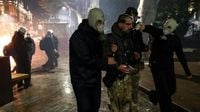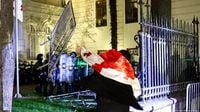On October 4, 2025, the streets of Tbilisi erupted in chaos as riot police deployed water cannons, pepper spray, and tear gas to disperse tens of thousands of protesters attempting to storm Georgia’s presidential palace. The dramatic confrontation unfolded as the South Caucasus nation held municipal elections, a vote boycotted by the country’s main opposition blocs amid what rights groups and critics describe as a sweeping crackdown on dissent and civil liberties.
From early morning, demonstrators began flooding Freedom Square and Rustaveli Avenue, waving Georgian and European Union flags—a potent symbol of the country’s longstanding aspiration to join the EU, a goal enshrined in its constitution. According to Reuters and the Associated Press, the rallies were organized by a coalition of opposition groups, rights campaigners, and public figures including veteran opera singer Paata Burchuladze. Their message was clear: they were protesting the ruling Georgian Dream (GD) party’s increasingly authoritarian policies and what they see as a dangerous drift toward Russia’s sphere of influence.
“We fight for our rights, for independence,” protester Sophio Asatiani told The Associated Press. “I don’t want to see a return to the Soviet era, when Georgia was ruled from Moscow.”
The municipal election itself was marked by controversy before polls even opened. The two largest opposition blocs announced a boycott, denouncing the vote as illegitimate and accusing the GD government—widely seen as controlled by billionaire founder and former prime minister Bidzina Ivanishvili—of rigging previous elections and stifling dissent. The government, for its part, denied all allegations of vote-rigging and pro-Moscow sympathies, insisting it seeks EU membership while maintaining stability with Russia.
As the day wore on, the mood in central Tbilisi grew increasingly tense. Organizers called for a “peaceful revolution,” channeling widespread frustration with a government that has, over the past year, jailed opposition leaders, cracked down on independent media, and passed laws targeting civil society. The opposition’s call was echoed by jailed ex-president Mikheil Saakashvili, who urged citizens to take to the streets for what he called “the last chance” to save the country. “There are moments when action is needed here and now,” Saakashvili wrote on Facebook. “Freedom is now or never!”
By late afternoon, the protests had grown to tens of thousands, with participants barricading streets, lighting fires, and clashing with heavily armored riot police. According to Al Jazeera and local media reports, some protesters attempted to break through the gates of the presidential palace, smashing the fence before being driven back by a determined police response. The Ministry of Internal Affairs quickly declared the rally unlawful, stating it had “exceeded the norms set by law.”
Authorities responded with force. Water cannons swept across the crowds, pepper spray and tear gas filled the air, and riot police in full gear advanced on demonstrators. The Health Ministry, quoted by Reuters, reported that 21 security personnel and six protesters were injured in the clashes. Five political activists—including Burchuladze and two members of the United National Movement, Georgia’s largest opposition party—were detained and charged with calling for the overthrow of the authorities, a crime that carries a potential nine-year prison sentence if convicted.
Despite the violence and mass arrests, the Central Election Commission declared the vote had passed without major disturbances and that results would be announced within hours. Georgian Dream quickly claimed victory in every municipality across the country’s population of 3.7 million, echoing a statement posted on Facebook that the party had “won elections in all municipalities without exception.” Preliminary turnout data, however, indicated less than 30% participation by midday, a figure that opposition analysts like Giorgi Rukhadze dismissed as evidence of a “mock election.”
International scrutiny of the election was notably absent. While more than 50 international and local groups registered to observe the vote, major watchdogs—including delegations from the European Parliament, the Organization for Security and Cooperation in Europe, and leading U.S. non-profits—declined to participate, citing the government’s recent repressive laws and a deteriorating political environment. Key Georgian NGOs also refused to deploy missions, underscoring the sense of crisis surrounding the vote.
Georgia’s political turmoil has deep roots. Once regarded as one of the most pro-Western states to emerge from the collapse of the Soviet Union, the country’s relations with Europe and the United States have soured since Russia’s full-scale invasion of Ukraine in 2022. Last year, following a disputed parliamentary election, the government abruptly froze accession talks with the European Union—a move that triggered months of mass demonstrations. Critics accuse the ruling party of modeling new laws on Russian legislation designed to stifle dissent, targeting not only protesters but also rights groups, NGOs, and independent journalists.
Amnesty International issued a statement on the eve of the vote, warning that “the elections in Georgia are taking place amid severe political reprisals against opposition figures and civil society.” The organization added, “With opposition leaders jailed and civil society organisations under attack... people’s rights to freedom of expression, association and peaceful assembly are being crushed.”
Prime Minister Irakli Kobakhidze, meanwhile, struck a defiant tone, accusing opposition organizers of “radicalism” and warning that “many may find themselves behind bars.” According to rights groups, around 60 people—including opposition figures, journalists, and activists—have been jailed over the past year in connection with anti-government protests.
For many in Georgia, the events of October 4 mark a turning point. The crackdown on demonstrators, the absence of credible election observers, and the government’s increasingly hardline stance have deepened fears that the country is sliding away from its democratic aspirations. As protester Davit Mzhavanadze told Reuters, “Today is the outcome of a deep crisis which is absolutely formed by our pro-Russian and authoritarian government. I think this protest will continue until these demands will be responded to properly from our government.”
With both sides entrenched and the political crisis deepening, Georgia faces an uncertain future. The coming days and weeks will test whether the government can restore trust and stability—or whether the wave of unrest will continue to reshape the country’s political landscape.



